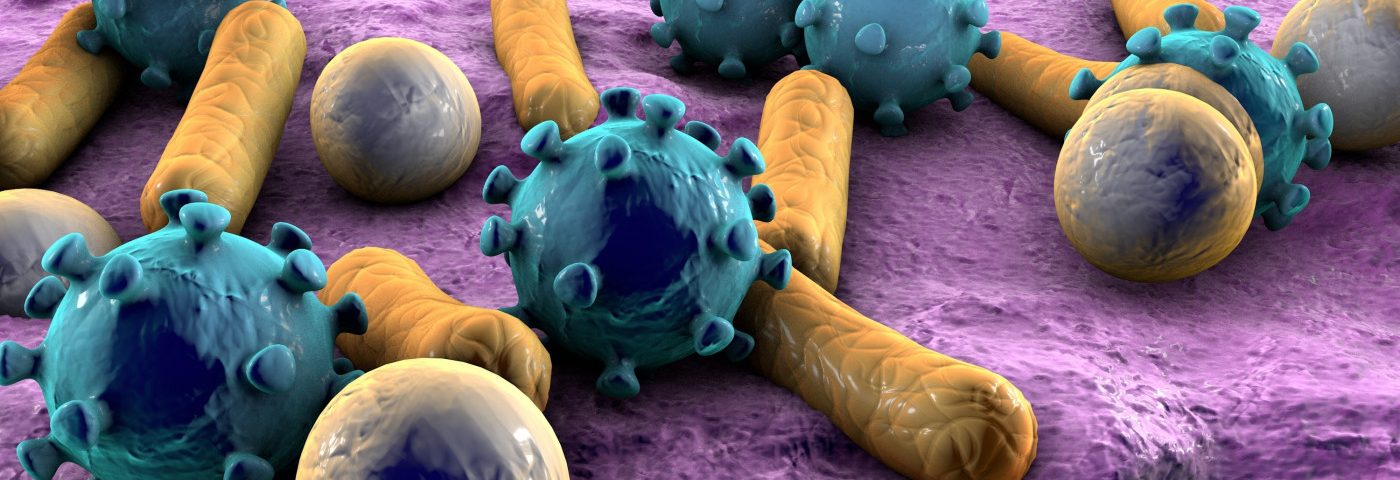Researchers at UT Southwestern Medical Center have discovered a way to target a specific population of bacteria that promotes gut inflammation in mice. While more studies are needed, they believe the discovery could lead to a new target for therapy development.
Scientists refer to the strategy as the “precision editing” of the gut microbiome, which helped reduce inflammation in a mouse model of colitis without affecting other bacterial populations that are important for overall intestinal health. While the strategy is not yet safe for application in humans, it provides proof-of-principle to develop future bacteria-targeted therapeutics for inflammatory bowel disease (IBD).
“Our results provide a conceptual framework for precisely altering the bacterial species that line the gut in order to reduce the inflammation associated with the uncontrolled proliferation of bacteria seen in colitis and other forms of inflammatory bowel disease,” Sebastian Winter, assistant professor of microbiology and the study’s co-corresponding author, said in a press release.
The study, “Precision editing of the gut microbiota ameliorates colitis,” was published in the journal Nature.
The human gut microbiome — the vast collection of different microbes that reside in the gut — is essential for a healthy intestine and overall body functions. However, the quantity of each microbial community needs to be well-balanced. For example, members of the Enterobacteriaceae family of bacteria are usually present in small numbers in a healthy gut, as they are an important source of protection against pathogens such as salmonella.
But patients with IBD and mouse models of inflammation in the colon (colitis) are characterized by uncontrolled growth of Enterobacteriaceae, researchers said.
In a previous study published in the journal Cell Host & Microbe, scientists showed that members of the Enterobacteriaceae family developed unique ways of promoting their growth and surpassing the number of other bacteria in the gut.
The study, “Microbial Respiration and Formate Oxidation as Metabolic Signatures of Inflammation-Associated Dysbiosis,” showed that the bacteria increased certain metabolic pathways, and by doing so, they promoted inflammation-associated dysbiosis, or microbial imbalance.
“These pathways are unique in the sense that they are only present in certain bacteria and only function during gut inflammation. That situation presented an opportunity for rational design of prevention and treatment strategies for conditions related to gut inflammation, such as IBD,” Winter said.
The team devised a strategy to overcome the bacteria’s metabolic imbalance by feeding mice the heavy metal tungsten in the mice’s drinking water. This inhibited the metabolic processes of Enterobacteriaceae bacteria present in the mouse model of colitis.
“The overall idea is that the tungsten threw a wrench into the way Enterobacteriaceae produce energy, slowing the growth of the pathogenic bacteria during flares of inflammation,” said Wenhan Zhu, co-lead author of the study and a postdoctoral researcher in Winter’s laboratory.
The bacteria were seen to take in the tungsten, which was then incorporated into an important bacterial cofactor that stopped working properly. As a result, the Enterobacteriaceae bacteria were no longer able to thrive in the gut. Most importantly, researchers found that healthy bacteria were not affected by the oral administration of tungstate, likely because they use a different cofactor to generate energy.
“It is worth noting that our strategy only inhibits the bloom of Enterobacteriaceae during intestinal inflammation without getting rid of them entirely. This finding is important because in the proper ratios, Enterobacteriaceae also fulfill the role of resisting colonization by bacterial pathogens,” Winter said. “Therefore, controlling the bloom of these bacteria during episodes of inflammation is preferable to removing them from the system completely.”
Researchers have long speculated that changes in the gut microbiome’s composition can worsen gut inflammation, but evidence had been lacking.
The UT Southwestern team saw that tungstate treatment re-balanced the gut microbiome and reduced inflammation. While the treatment didn’t cure the inflammation, it improved the mice’s overall health.
However, the researchers noted that they are far from converting this lab discovery into a possible therapeutic treatment for patients. Tungsten is a heavy metal and can induce serious harmful effects in the brain and reproductive organs if ingested.
“We stress that this is a proof-of-concept study in which a form of tungsten, a heavy metal that is dangerous in high doses, was used. It is never safe to ingest heavy metals. Now that we have a drug target [the bacterial pathway], our goal is to find a safe therapy that exerts a similar effect,” Winter said.
Winter noted that doctors often use broad-spectrum antibiotics to kill off as many bacteria as possible. But those antibiotics can have a devastating effect on the gut microbiota. He likened it to “using a torch in a flower bed and hoping that once you kill the weeds, the flowers will flourish.”
But Winter’s team discovered a method to target only one family of bacteria during inflammation, and that suggests a potential new therapeutic avenue for gut inflammation.
“More study is needed to find potential therapies for human disease, but this is a promising first step,” he said.

